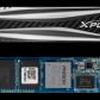ADATA today announces the launch of a new generation of industrial-grade DDR5 memory modules that offer a major leap forward in performance
They are geared toward assisting the development of 5G, AI, Edge Computing, High-Performance Computing, Automated Vehicles, and Smart Healthcare, to name a few.
According to Yole Developments, DDR5 memory shipments will exceed DDR4 by 2023 and DDR5 sales will account for 90% of the market by 2026. DDR5 will be the undisputed standard of the future and a key component of 5G, AIoT, and other applications. To meet the future demands of its customers, ADATA has unveiled a slew of DDR5 memory modules, including U-DIMM and SO-DIMM variants. The modules utilize select high-quality ICs straight from the manufacturer and will come with capacities of 8 GB and above. Compared with DDR4, DDR5 has twice the bandwidth and offers higher frequencies of up to 4800 MHz. What's more, they operate on just 1.1 V for improved energy efficiency.
ADATA industrial-grade DDR5 memory modules are equipped with Power Management ICs (PMIC), which move power management functionality from motherboards to memory modules. This allows for more efficient adjustment of voltage for enhanced stability and performance. The modules are tested to ensure the utmost reliability and performance for meeting the needs of enterprise-level servers for big data analysis, deep learning, and high-performance computing. The modules also sport Thermal Sensor technology and on-die error correcting code to prevent overheating and maintain stable and accurate signal transmissions.
The modules can also be equipped with other value-added features according to specific needs. They include 30µ PCB gold plating for improved signal transmission reliability; anti-sulfuration protection, and conformal coating technology for resilience against pollution, dust, and humidity.
ADATA DDR5 memory modules are the first to be unveiled for industrial-grade applications and will begin mass-production in Q4 2021. In addition to the existing specifications, ADATA also looks to offer modules with other specifications such as R-DIMM, ECC, VLP DIMM, and wide-temperature series to meet the diverse needs of different applications and customers.
For more information, visit this page


